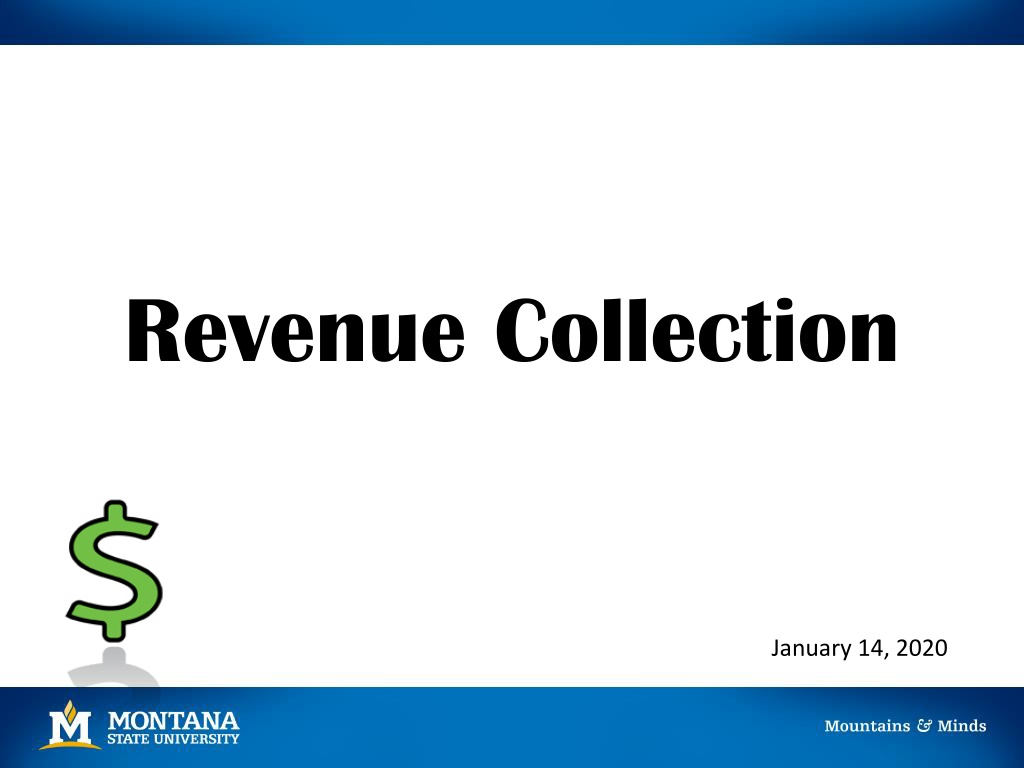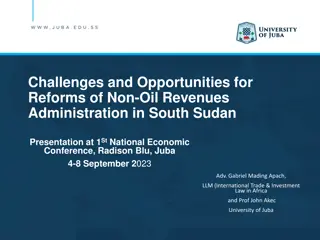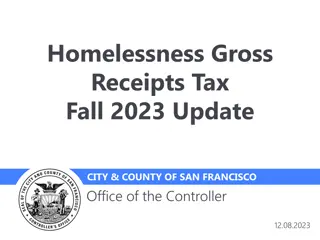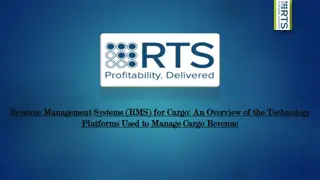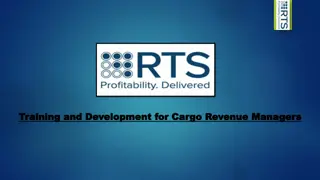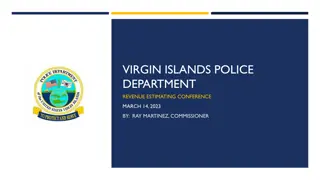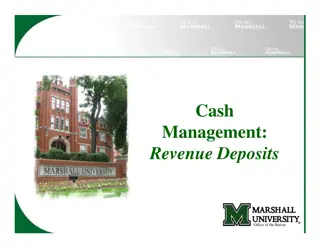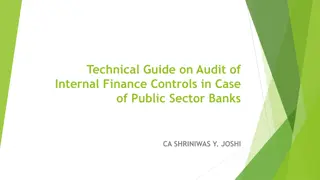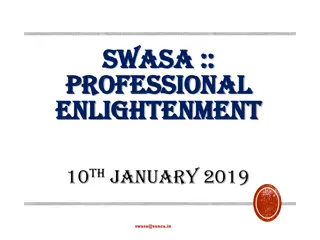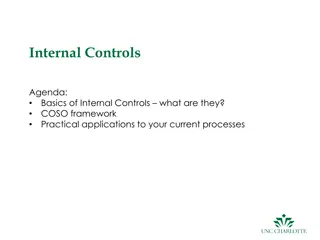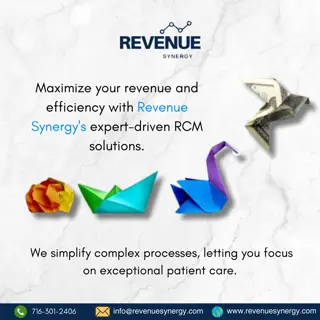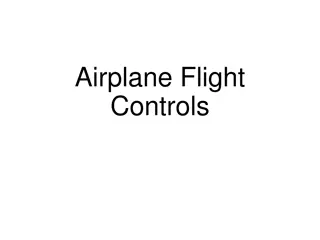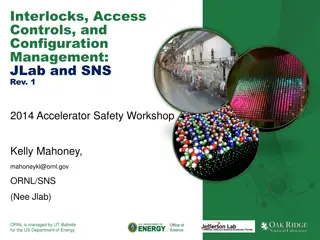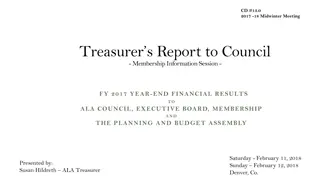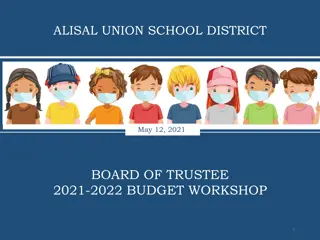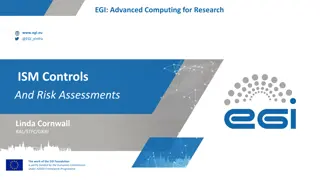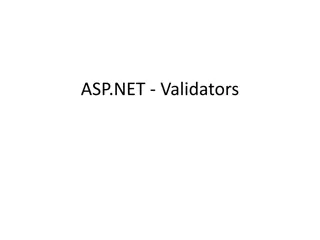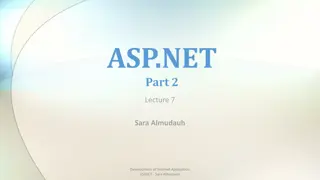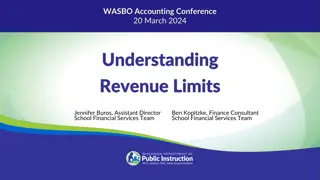Revenue Collection and Controls Overview
This document provides insights into revenue collection procedures, risks associated with revenue collection such as skimming, controls to prevent fraud, segregation of duties, and key controls for revenue collection. It emphasizes the importance of proper procedures, staff separation, and diligent oversight to safeguard financial assets.
Download Presentation

Please find below an Image/Link to download the presentation.
The content on the website is provided AS IS for your information and personal use only. It may not be sold, licensed, or shared on other websites without obtaining consent from the author. Download presentation by click this link. If you encounter any issues during the download, it is possible that the publisher has removed the file from their server.
E N D
Presentation Transcript
Revenue Collection January 14, 2020
Overview Risks and Controls for Revenue Collection Types of Funds used for Revenue Collection Procedures for Revenue Collection Accepting Credit Card Revenue Grant Revenue Collection Change Funds and Petty Cash
Risks of Revenue Collection Skimming - any scheme in which cash is stolen from an organization before it is recorded on the organization s books and records In March 2011, a former UM Residence Life employee was charged with five felony counts for embezzling more than $300,000. In 1998, a former MSU Student Health Services employee was convicted of four felonies for embezzling $208,000 and spent six months in prison. Being falsely accused of skimming Sources: Association of Certified Fraud Examiners. Missoulian. Bozeman Daily Chronicle.
Controls for Revenue Collection Departmental Revenue Collection Procedures Model Internal Control Assessment Revenue Collection http://www.montana.edu/audit/guidance.html
Segregation of Duties Authority to execute transactions (e.g., can delete revenue transactions in software application) Custody of assets (e.g., cash and checks) Recording of transactions (e.g., preparation of bank deposit) Reviewing transactions (e.g., reconciling bank statement) Source: Standards for Internal Control in the Federal Government. GAO. September 2014.
Key Controls for Revenue Collection If there is insufficient staff for ideal separation of duties, procedures are in place that compensate for the lack of separation (e.g. supervisory review) A comparison of revenue received to expected or budgeted revenue can help identify issues
Key Controls for Revenue Collection Procedures must prevent skimming at the initial receipt of revenue. Records of initial receipt must be retained to prove that all revenue received was deposited The change fund is balanced each day it is in use (amount authorized for the change fund plus amount recorded as received that day equals amount on hand)
Accounts Receivable (AR) The billing system and accounts receivable records should be integrated (in most cases) Segregated duties of ability to alter AR records from revenue collection If an alternative information system is used: Access controls should be implemented It should be reconciled to Banner Unpaid accounts receivable balances should be reported to University Business Services (UBS) by June 30th of each year for accrual on the financial statements.
AR Collection and Write-Off Procedures Accounts receivable aging reports should be reviewed At 60, 90 and 120 days past due, accounts receivable personnel should attempt personal contact with the customer. At 120-days past due, a commercial collection agency may be used for outstanding balances (Contact UBS). Legal Counsel may also help by issuing a letter to the debtor. Bad debt write-offs should be authorized in writing by supervisory personnel, such as a director or department head.
AR Aging Report Format Example Source: Adapted from Third Party accounts receivable report from Banner information system provided by Director of Student Accounts of MSU University Business Services on January 9, 2020.
Other Revenue Collection Considerations Donations (Acceptance and Processing of Gifts Policy) Donations for research should be recorded in Banner Index associated with program code 02 Testing services (Testing Services Policy) Should be recorded in a Banner Index associated with program code 02
Other Revenue Collection Considerations Compliance requirements to which MSU is subject prohibit or limit use of certain ways for receiving and/or depositing revenue. UBS can provide information about and help arrange compliant ways. NO outside bank accounts (e.g., local banks); unless a registered student organization (RSO) and if an RSO, RSO policies and procedures apply. NO online payment receiving system (e.g., PayPal) may be linked to or made available from webpages hosted by any department or other organizational unit of the university. Online payment receiving through the Commerce Manager system authorized by the university requires prior approval by UBS.
Funds Where Income Can Be Recorded Gift Indexes (4Wxxxx, 42xxxx) donations, grants, Foundation Designated Indexes (43xxxx) sales and service activity Auxiliary Indexes (44xxxx) on campus services Plant Indexes (46xxxx) transfer income only
Deposit of Monies Refer to UBS Business Procedures Manual, Section 350.00 Checks must be endorsed at time of initial receipt. Endorsement should read: FOR DEPOSIT ONLY DEMAND ACCOUNT-STATE OF MONTANA- MONTANA STATE UNIVERSITY (MSU DEPARTMENT NAME) Departments can order endorsement stamps from any vendor, however if your department is new to receiving revenue, please contact UBS first
Deposit of Monies (cont) Timely deposits: Departments are required to make deposits each day when the following situations exist: Accumulated $200 in cash or Accumulated $750 in cash and checks or Credit card activity in any amount Departments are required to deposit all cash and checks at least weekly, regardless of amount collected
Deposit of Monies (cont) Security: Collections should be secure at all times Cash deposits of $500 or more must be transported to the UBS Cashier s Office in locked cash bags. All deposits should be carried in an inconspicuous manner (inside a backpack, etc.), varying the times and if possible, the personnel Departments with deposits containing $1,000 or more in cash must request an escort from University Police if located more than one block from Montana Hall
Cash Receipt (aka Deposit Slips) Triplicate form white, yellow, pink. All three copies should come with your deposits. White copy is retained by UBS Cashiers, yellow and pink are returned to department for cash and check deposits, only yellow is returned to department for credit card deposits Blank forms are available from UBS Cashiers or University Printing can customize slips for departments (e.g. to include department name, etc.)
Accepting Credit Cards Refer to UBS Business Procedures Manual, Section 370.00 A department wishing to accept credit card payments must complete the form Application for Authorization to Process Bankcard Transactions found here: http://www.montana.edu/ubs/forms.html This form will be reviewed and approved by UBS
Procedures for daily receipting of credit card revenue Manual Terminal Merchant At the end of each business day, the end of day batch process/ settlement must be run to initiate the process to move money from the customer to our bank. The signed copies (the white copy) of the credit card receipts are to be added (double adding machine tapes) using the total net sales per receipt. These copies and calculator tape plus the batch tapes are to be provided to the UBS cashiers with a three-part UBS receipt showing the proper index(es) and account code(s) for the deposit. On the face of the receipt, designate that these were credit card sales. NEVER combine credit sales with deposits of cash and checks. Credit card sales receipts must be provided to the UBS Cashiers by 11 AM of the following workday. It is critical that the UBS receipt prepared by the merchant department be accurate and legible.
Procedures for daily receipting of credit card revenue Website Merchant (Commerce Manager) Payments taken via a departmental website using the approved university standard payment gateway will be automatically batched and receipted for the department by UBS
Procedures for monthly reconciliation of deposits to Banner At least each month, the departmental accountant compares totals per each Cash Receipt form to transactions from the Operating Ledger Transactions report from the Banner Reports Web for each index that revenue is deposited. Corrections to revenue are handled through either UBS Accounting or the UBS Cashiers. If the department has made an error, a Finance Correction form can be submitted directly to UBS. For data entry errors, please contact the UBS Cashiers and reference the cash receipt number. If the department has a discrepancy that they cannot resolve, they should contact either the Cashiers or UBS Accounting for assistance.
Restricted Funds Grants (4Wxxxx) Account code determined by OSP Gifts/Donations, Foundation reimbursement accounts (423xxx) Account code 53950 Scholarships (422xxx) Account code determined by Financial Aid
Grant Revenue Collection Revenue collection on grant funding is the responsibility of the Office of Sponsored Programs (OSP) OSP does not follow normal cashiering procedures they have their own process Most grants are cost reimbursable, meaning funds are not received when the grant is awarded. OSP invoices the grant sponsor after spending occurs Departments should never make entries or corrections to grant revenue account codes
Grant Revenue Collection (cont) Most grant revenue collection from federal agencies is done electronically Grant revenue received by departments should be forwarded to OSP upon receipt If you (not OSP) receive revenue related to federal grant activities, contact OSP about program income regulation considerations. This income must meet strict accounting and reporting requirements. It is very rare and must be reviewed with your OSP Fiscal Manager Abatement of grant expenditures should always be reviewed and approved by OSP prior to submission to cashiers Any questions about grant revenue, expenditure abatement or cash balances should be addressed to an OSP Fiscal Manager
Program Income Program Income is any income earned by the recipient that is directly generated by a supported activity or earned as a result of the award during the period of performance. That income is considered part of the award and must be spent on award activities. Examples of Program Income: income from fees for services performed (such as laboratory tests); money generated from the use, or rental of property acquired under awards (including supplies and equipment); proceeds from the sale of commodities or items fabricated under an award; income from the sale of research materials such as animal models; fees from participants at conferences or symposia proceeds from the sale of publications or software Contact your OSP Fiscal Manager to determine if the program income will be reportable and how it will be handled, depending on the sponsor s policy
Designated Funds Sales & service activities, some student course fees, field trips, recharge centers (43xxxx, including IDCs-436xxx, 437xxx and 438xxx) Varied sources of income & account codes Recharge (between departments) - 53350 Educational Sales & Service - 53631 Charged 6% administrative fee on expenses May be subject to UBIT (Unrelated Business Income Tax)
Designated Funds - JRCs Sales & service activities between departments JRC Journal Recharge Income is always posted to 53350 Other side of transaction is ALWAYS an expense account code Since income can only come into the University once, these transactions are eliminated in the MSU Financial Statements. They are identified by the JRC rule code.
Designated Funds F&As (IDCs) F&As (IDCs) (436xxx, 437xxx, 438xxx) Account code 53360 Transfers of F&A revenue between F&A indexes should be approved by Leslie Schmidt or Peggy Kastella
Change Funds and Petty Cash Change funds can be requested for temporary or permanent/long term purposes Change funds should be balanced each day Petty cash should be verified on a periodic basis (cash plus unreimbursed receipts = authorized amount of fund) Petty cash should be replenished at least monthly Petty cash may only be paid out for expenses less than $25 Travel expenses may NEVER be reimbursed via petty cash regardless of amount Official fund custodian must be named for both types of funds. Changes to the fund custodian can be made by submitting a Permanent Petty Cash Change of Custodian form found on the UBS Forms website: http://www.montana.edu/ubs/forms.html
Returning Change Funds Return of either type of change fund (temporary or permanent) should be done through the UBS Cashiers DO NOT include a deposit slip for these funds or include them in a deposit for your revenue DO band these funds together separately from your other deposits and indicate they are returned change funds. It is helpful to include a copy of the change fund form.
Returning Petty Cash Funds Submit BPA with any outstanding receipts, to bring Petty Cash fund back to original authorized amount Once you have full original amount, contact UBS Accounting to return the funds DO NOT prepare a deposit slip
Important Links University Business Services Website http://www.montana.edu/wwwbu/ University Business Procedures Manual http://www2.montana.edu/policy/business_manual/ Specifically Section 300.00 Cashier Activity Office of Audit Services-Guidance http://www.montana.edu/audit/guidance.html Internal Control in Higher Education Internal Control Assessments - Revenue Collection Departmental Revenue Collection Procedures Model
Important Contacts Questions about Grant Revenues: Peggy Kastella, Financial Officer, 994-2381 Peggy.Kastella@montana.edu OSP Financial Managers Who handles my grant? http://www.montana.edu/research/osp/documents/grants/OSPFiscalManagers.pdf Questions about Revenue Account Codes: UBS Accounting, 994-5727 UBSHelp@montana.edu Questions about Control Assessments: Office of Audit Services, 994-1805 Daniel Adams or Ila Saunders
